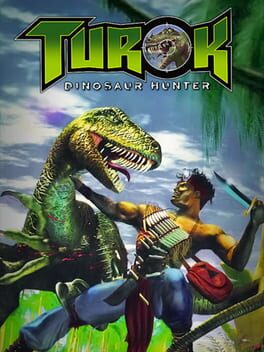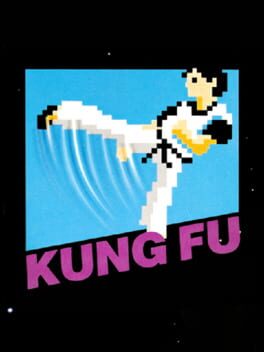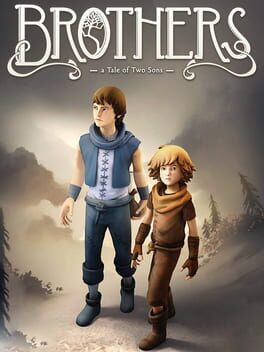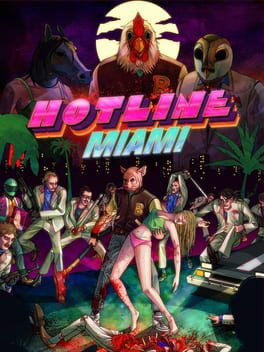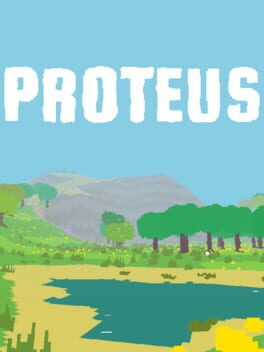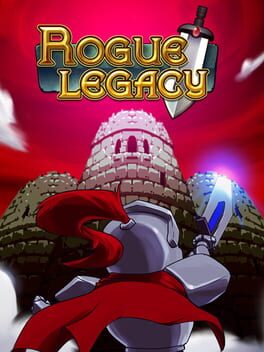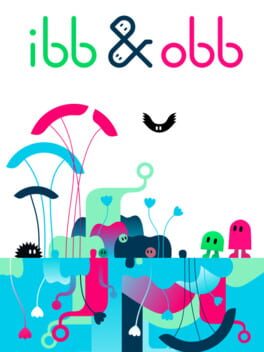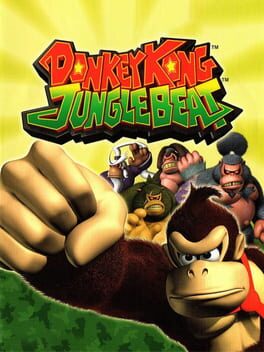1993
1985
This review contains spoilers
Starbreeze Studios teamed up with Swedish film director Josef Fares to make Brothers: A Tale of Two Sons. The marriage of game and film produced a non-stop cinematic experience in which no time is spent fumbling through menus, button schematics, or overly challenging puzzles. It's a thrilling three hours for the price of a movie ticket.
The game's bubbly character models and tidbits of humor make it appear less exotic than somber influences like Ico, Shadow of the Colossus, and Journey, but the solemn story is riddled with suffering and delivered in a fictional language that masks any disastrous voice acting. With its maturity in question, the last thing this game needed was a Jake Lloyd sound-alike.
Although Brothers is an amalgam of gameplay focused on simultaneous activity of two protagonists, the linear action never feels forced. All dual activities melt perfectly into plot events instead of feeling like a loosely connected series of mini-games. The slick environments also suppress the gimmick, even though there are moments when the acrobatic boys can't overcome grossly insignificant roadblocks without first solving puzzles.
Basic movement is similar to Ico but there are no customary jump or attack buttons, only one button per brother that interacts with triggerable objects or people. The brothers meet many troubled characters along the way and help them through their hardships. Some of them will assist in return, like the troll in the first chapter who can throw the boys across big gaps and position himself to be walked or climbed across.
Brothers: A Tale of Two Sons is an instant classic that successfully combines interactivity and cinema. Those concerned about the short length should know it's absolutely worth a second play at minimum.
The game's bubbly character models and tidbits of humor make it appear less exotic than somber influences like Ico, Shadow of the Colossus, and Journey, but the solemn story is riddled with suffering and delivered in a fictional language that masks any disastrous voice acting. With its maturity in question, the last thing this game needed was a Jake Lloyd sound-alike.
Although Brothers is an amalgam of gameplay focused on simultaneous activity of two protagonists, the linear action never feels forced. All dual activities melt perfectly into plot events instead of feeling like a loosely connected series of mini-games. The slick environments also suppress the gimmick, even though there are moments when the acrobatic boys can't overcome grossly insignificant roadblocks without first solving puzzles.
Basic movement is similar to Ico but there are no customary jump or attack buttons, only one button per brother that interacts with triggerable objects or people. The brothers meet many troubled characters along the way and help them through their hardships. Some of them will assist in return, like the troll in the first chapter who can throw the boys across big gaps and position himself to be walked or climbed across.
Brothers: A Tale of Two Sons is an instant classic that successfully combines interactivity and cinema. Those concerned about the short length should know it's absolutely worth a second play at minimum.
2012
I saw a few screenshots of Hotline Miami and expected a quirky Grand Theft Auto clone like the charming Retro City Rampage. What I got was the most violently psychotic experience I've had the pleasure of playing in a while.
The dismantled story was difficult to deconstruct. I was too caught up in kill, kill, kill. I'll do my best to summarize: Countless thugs await around corners for you to mangle in any way you see fit. Who are you? Some dude in a varsity jacket that wears animal masks and takes big-time hit jobs.
Hotline is absolutely filthy from the blood, drugs, and language to the dirty little beats that get your blood pumping and coming back for more, even after having to retry every five seconds. You can only take one blow like your enemies, but quick restarts should encourage the player to mindlessly brawl into rooms with guns blazing at least a few times before having to take a slower, more stealthy approach if need be.
I had some trouble with the targeting system on occasion, but otherwise the control is spot-on and can be explained within seconds, reminiscent of the retro games that share its look and sound.
If I had to say it was like anything else, games like Loaded and Project Overkill for the original Playstation come to mind. But in those games, dying was a major setback and the levels were longer and not nearly as detailed... or fun.
The creators claim to have been inspired by the film Drive, but I was getting more of a schizophrenic serial killer vibe the likes of Killer7 by Suda51. Hotline actually has the 1-up on Killer7 in terms of playability and pace.
The story is perhaps best left unexamined and ambiguous. The undeniable draw to the characters may actually be within the costumes and art style. You really can't beat a good costume.
Foremost, Hotline Miami is a twisted thrill-ride of murder, death, kill. Plain and simple. Grab a weapon and get wet.
The dismantled story was difficult to deconstruct. I was too caught up in kill, kill, kill. I'll do my best to summarize: Countless thugs await around corners for you to mangle in any way you see fit. Who are you? Some dude in a varsity jacket that wears animal masks and takes big-time hit jobs.
Hotline is absolutely filthy from the blood, drugs, and language to the dirty little beats that get your blood pumping and coming back for more, even after having to retry every five seconds. You can only take one blow like your enemies, but quick restarts should encourage the player to mindlessly brawl into rooms with guns blazing at least a few times before having to take a slower, more stealthy approach if need be.
I had some trouble with the targeting system on occasion, but otherwise the control is spot-on and can be explained within seconds, reminiscent of the retro games that share its look and sound.
If I had to say it was like anything else, games like Loaded and Project Overkill for the original Playstation come to mind. But in those games, dying was a major setback and the levels were longer and not nearly as detailed... or fun.
The creators claim to have been inspired by the film Drive, but I was getting more of a schizophrenic serial killer vibe the likes of Killer7 by Suda51. Hotline actually has the 1-up on Killer7 in terms of playability and pace.
The story is perhaps best left unexamined and ambiguous. The undeniable draw to the characters may actually be within the costumes and art style. You really can't beat a good costume.
Foremost, Hotline Miami is a twisted thrill-ride of murder, death, kill. Plain and simple. Grab a weapon and get wet.
2013
SPOILERS AHEAD. Not that there's any semblance of plot, but if you wish to keep your expectations in the dark.
I knew nothing about Proteus going in and intentionally stayed away from any explanation of its purpose. I was intrigued by the game's Myst-like non-direction, and wanted to figure out what I could on my own.
For a while, I wandered about this crudely pixelated and randomized island at a sluggish pace. I could sit, walk, take screenshots, and close my eyes slowly which I quickly learned was the way to quit.
I walked and walked, but didn't find much. I found what seemed like frogs that sprang musical notes with each hop. More animals that would do the same. I found one house with no entrance. That's about it.
The musical score of washy tones is decent, but I wasn't blown away by the animals trotting along with the music; we've seen music accompany actions in games like Rez and The Legend of Zelda: Wind Waker. The bright and simplistic art direction wasn't that impressive, either. While I strolled around this tiny island, I wondered if the music and graphics would gradually improve if I hit the right triggers... Maybe that was the objective. As it were, it felt like a terribly unfinished version of Skyrim.
I walked around the same dull, but admittedly tranquil island. I saw some sweeping mist and fixed myself into its pull, and raced along with it for a few seconds until it formed a swirling ring. I sat inside of it like in Journey, which I think was unnecessary. The season changed. I had another long look around and found nothing new except the seasonal aesthetic. I repeated the mist routine once more and changed the season again. And again.
And then, for some reason I was doing something I would define as hardly flying, and then the game ended as a trophy popped along with the credits.
Afterwards, I checked the trophy list and the internet to see if there was anything deeper. The trophy list seemed to make me think there was, while all online explanations of the game remarked on its interactive simplicity and pure exploratory nature- another "soothing" experience. On the game's Wikipedia page, one of the creators admitted that he was attempting to make an Elder Scrolls type game but grew discouraged and gave up. I guess I wasn't too far off.
Should Proteus be regarded as an artsy release that challenges the classifications of a video game, or should it be considered unfinished and unworthy of the fifteen dollar price tag? I feel a bit ripped off. Let's leave daring questions like, "what is a video game?" to thatgamecompany. The hoopla around Proteus should beg a different question: can the implementation of trophies turn a hardly interactive game of nothing into an exploration game with objectives?
I knew nothing about Proteus going in and intentionally stayed away from any explanation of its purpose. I was intrigued by the game's Myst-like non-direction, and wanted to figure out what I could on my own.
For a while, I wandered about this crudely pixelated and randomized island at a sluggish pace. I could sit, walk, take screenshots, and close my eyes slowly which I quickly learned was the way to quit.
I walked and walked, but didn't find much. I found what seemed like frogs that sprang musical notes with each hop. More animals that would do the same. I found one house with no entrance. That's about it.
The musical score of washy tones is decent, but I wasn't blown away by the animals trotting along with the music; we've seen music accompany actions in games like Rez and The Legend of Zelda: Wind Waker. The bright and simplistic art direction wasn't that impressive, either. While I strolled around this tiny island, I wondered if the music and graphics would gradually improve if I hit the right triggers... Maybe that was the objective. As it were, it felt like a terribly unfinished version of Skyrim.
I walked around the same dull, but admittedly tranquil island. I saw some sweeping mist and fixed myself into its pull, and raced along with it for a few seconds until it formed a swirling ring. I sat inside of it like in Journey, which I think was unnecessary. The season changed. I had another long look around and found nothing new except the seasonal aesthetic. I repeated the mist routine once more and changed the season again. And again.
And then, for some reason I was doing something I would define as hardly flying, and then the game ended as a trophy popped along with the credits.
Afterwards, I checked the trophy list and the internet to see if there was anything deeper. The trophy list seemed to make me think there was, while all online explanations of the game remarked on its interactive simplicity and pure exploratory nature- another "soothing" experience. On the game's Wikipedia page, one of the creators admitted that he was attempting to make an Elder Scrolls type game but grew discouraged and gave up. I guess I wasn't too far off.
Should Proteus be regarded as an artsy release that challenges the classifications of a video game, or should it be considered unfinished and unworthy of the fifteen dollar price tag? I feel a bit ripped off. Let's leave daring questions like, "what is a video game?" to thatgamecompany. The hoopla around Proteus should beg a different question: can the implementation of trophies turn a hardly interactive game of nothing into an exploration game with objectives?
2013
Over the past few years, I've heard the term "roguelike" being used to describe many upcoming fantasy-themed games. Even though practically anything with a sword has been my jam since the original Zelda, screenshots of said games failed to pique my interest. The reemerging genre was being exemplified by previously underutilized ideas like permadeath and random maps, but the big turnoff for me was the tile-based gameplay. Rogue Legacy however focuses on twitch-perfect Metroidvania action instead, which is a grind I can get behind.
There's a neat little family tree gimmick which ties it all together. A foolhardy knight storms the randomized castle with a sword drawn outward, as if charging into certain doom. It's because they are, and will surely die in a matter of minutes. You will never see them again (permadeath) but can choose one of three random heirs, each with their own often hilarious attributes. Choosing an heir with IBS won't impact your play, but there are throwaway traits like vertigo which are all but unplayable and only novel at a glance.
The chosen heir can immediately exchange the treasure found by the previous ancestor to level up the overall family so that the bloodline grows exponentially stronger. Therein lies the addictive part of Rogue Legacy: to spend the profits you just worked so hard for is to begin the cycle over with a new heir. Rinse, repeat.
I meant to give it a quick try one night but ended up playing until morning. I started discussing and researching it constantly, spreading the word to friends. I was hooked; Rogue Legacy was the real deal. I hadn't been that engrossed in grinding levels in quite some time. I was working toward collecting every achievement sans the insane trophy with a requirement to beat the game with fifteen heirs or less.
Then, at the peak of my obsession, my save file was mysteriously corrupted and erased. I was nearing level 150 and had three of the four bosses defeated. To start over at that point was beyond discouraging, although it couldn't have been much more than ten hours lost.
Now, I can tolerate the grind in only small doses, running through the castle with a few heirs per sitting as opposed to binge playing all night long. It took a corrupted file for me to regard Rogue Legacy without blinders, but the second time around, the novelty started to wear thin and I surmised that a randomized castle could never be as special as one that's fixed and familiar.
There's a neat little family tree gimmick which ties it all together. A foolhardy knight storms the randomized castle with a sword drawn outward, as if charging into certain doom. It's because they are, and will surely die in a matter of minutes. You will never see them again (permadeath) but can choose one of three random heirs, each with their own often hilarious attributes. Choosing an heir with IBS won't impact your play, but there are throwaway traits like vertigo which are all but unplayable and only novel at a glance.
The chosen heir can immediately exchange the treasure found by the previous ancestor to level up the overall family so that the bloodline grows exponentially stronger. Therein lies the addictive part of Rogue Legacy: to spend the profits you just worked so hard for is to begin the cycle over with a new heir. Rinse, repeat.
I meant to give it a quick try one night but ended up playing until morning. I started discussing and researching it constantly, spreading the word to friends. I was hooked; Rogue Legacy was the real deal. I hadn't been that engrossed in grinding levels in quite some time. I was working toward collecting every achievement sans the insane trophy with a requirement to beat the game with fifteen heirs or less.
Then, at the peak of my obsession, my save file was mysteriously corrupted and erased. I was nearing level 150 and had three of the four bosses defeated. To start over at that point was beyond discouraging, although it couldn't have been much more than ten hours lost.
Now, I can tolerate the grind in only small doses, running through the castle with a few heirs per sitting as opposed to binge playing all night long. It took a corrupted file for me to regard Rogue Legacy without blinders, but the second time around, the novelty started to wear thin and I surmised that a randomized castle could never be as special as one that's fixed and familiar.
2013
Ibb and Obb is a fun little platformer wherein two mushroom-bodied characters must work in unison to overcome mind-boggling puzzles and continue their journey from the left side of the screen to the right.
You can play alone with both joysticks, but I don't recommend it. You're going to need the extra hands for some of the impending twitch play and pitch-perfect timing, and having an extra brain handy ought to get the job done twice as fast.
Simple and slick in presentation and easy to pick up and play, it's fair to say Ibb and Obb is an obvious choice for someone into cooperative gaming, although I wouldn't be comfortable calling it a no-brainer.
You can play alone with both joysticks, but I don't recommend it. You're going to need the extra hands for some of the impending twitch play and pitch-perfect timing, and having an extra brain handy ought to get the job done twice as fast.
Simple and slick in presentation and easy to pick up and play, it's fair to say Ibb and Obb is an obvious choice for someone into cooperative gaming, although I wouldn't be comfortable calling it a no-brainer.
Mastering the art of using a bongo as a primary controller for a 2D platformer is an unexpected blast, but level design is where DKJB truly shines. Swirling through tubes that sew an asteroid belt together or riding the monstrous bull downhill are arcade-styled rushes that stamp a smile on your face for the entire trip.
